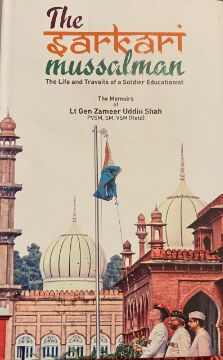Memoirs of a soldier
The Sarkari Mussalman — apparently a misnomer — is an autobiographical account of Zameer Uddin Shah’s life and travails across various battles ranging from Indo-Pak to Godhra

The title of the book — 'The Sarkari Mussalman' — written by distinguished retired Lt Gen Zameer Uddin Shah intrigued me. Though he had his early education in a madrassah in Sardhana (UP), his secondary education was completed in one of the elitist educational institutions — St Joseph's College, Nainital. Shah graduated from the National Defence Academy, Khadakwasla, and the Indian Military Academy, Dehradun. It is a little surprising that the book portraying the life of a vibrant military leader would get 'The Sarkari Mussalman' as its title. Even more glaring is the fact that the author, having held the most prestigious responsibilities within the establishment, would use this term. However, in the prologue of the book, Shah defines a Muslim as one who is pro-establishment and supports the government of the day. He further elaborates that for him (the sarkari mussalman) the bitter truth is secondary over the discretion to the point of sycophancy. Instead of challenging the stereotypes about his community, this 'courtier' positions himself as the voice of reason among the majority elite. He defines his religion in a way that is acceptable to the establishment and projects himself as a modern rationalist by being submissive, or worse, by actively pandering to bigotry against his co-religionists.
Such a definition notwithstanding, the 208-page autobiography by Gen Shah is worth a read. The book provides a graphical account of the author's ancestors, their connections with Iraq, Afghanistan and then Aligarh and Sardhana where his family finally settled. The narratives give an insight into the upbringing of Zameer Uddin Shah and his two brothers, especially the filmstar Nasiruddin Shah who, the author states in his book, was different from the rest and always wanted to be in the world of theatre and cinema. Interestingly, Zameer was more known to be as Nasir's brother due to the film glamour that he enjoyed in comparison to the military charisma of the distinguished soldier. When Zameer was appointed as the Deputy Chief of the Army, the newspapers splashed that Nasiruddin Shah's brother was the new Deputy Chief, eclipsing the glorious military profile of the author.
The book under review carries multiple such trivia that make the read very amusing. Dwelling upon his life and times, the author takes the readers to Saudi Arabia where he was posted as a defence attaché in the Indian Diplomatic Mission. For those interested in the 1965 and 1971 Indo-Pak wars, the author wonderfully makes a recollection of the Longewala episode of military action in Jaisalmer sector and then of the 1971 Bangladesh war. His interaction as a young officer with Maj Gen JFR Jacob amuses us when the celebrated Jewish military legend picked up Zameer Uddin in his set-up, raising some eyebrows.
Again, the author's active participation in the counter insurgency operations in the Northeast gives a wee bit of an insight into the problems of the region, and about the complexities of the tribals in Manipur and Nagaland. His exposure to the turbulent Northeast perhaps gave him the feeling that he is the most knowledgeable person in this domain. Many experts of the counter insurgency find his views as unreal but the author too is entitled to have his views.
The author credits the Army for reining in terror in the Punjab, ruling out any credit to Supercop KPS Gill. This is a very sweeping observation. Author must know that Gill, while in Assam in 1973, had successfully quelled the communal disturbances emanating from the Nellie massacre. Any move to undermine KPS Gill's contribution to bring normalcy in Punjab from the terror menace is nothing but a distortion of history. Again, the author says that when he was brought into Gujarat to control the violence arising out of Godhra incidents in 2002, Gill surfaced and hogged the limelight by taking the credit. Such an assessment appears far from convincing.
The chapters in author's stint in the Armed Forces Tribunal, and subsequently, the Vice Chancellor of the Aligarh Muslim University (AMU) for five long years, are very gripping and allow the readers to read into the circumstances leading to his appointment, and his attempts to streamline the AMU administration. However, the author's unceremonious exit from the AMU is saddening.
'The Sarkari Mussalmaan' is good in print quality and font and one can finish it in one sitting. Only thing I found was that the title and contents of the book don't somehow match.
The writer is a retired IPS officer, a security analyst and a former National Security Advisor to the PM of Mauritius. Views expressed are personal



